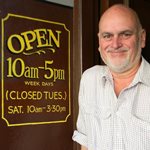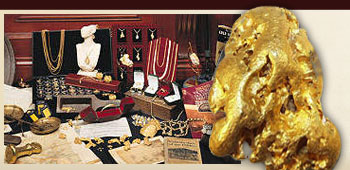
of Gold gifts, Jewellery and Souvenirs
8a Lydiard St North, Ballarat, Victoria, Australia
Telephone/Facsimile: +61 3 5333 4242
Email: mail@thegoldshop.com.au
>> view cart
Saturday 17th Jan, 9:39pm
Aussie Prospector Gold Story
Many people have asked me to write a little on my self, and gold detecting in Australia. This is a story that I wrote in 1995 after a quick trip to Western Australia prospecting for gold.
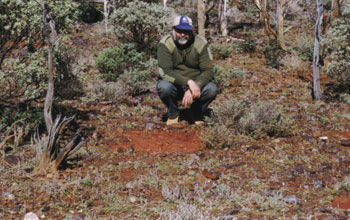 |
Cordell at the hole where he found a specimen with 4 ounce of gold in it within the first half an hour of detecting |
About a month ago one of my prospecting mates who lived Western Australia (WA), and I finally arranged to go bush to use metal detectors in the search for nuggets. My mate 'Mark' and I had been talking about this trip for some time but had never set aside the time to get away. Earlier this year he had some time off so he and his family came and stayed with us, and I took him out detecting for gold around here. We found gold every day we went out. Anyway this time we both had about a week to spare at the same time, so at short notice I booked a flight to WA, packed my swag and detecting gear and jumped on a plane.
Mark met me at Perth airport and we spent the rest of the day purchasing supplies. The next day we were up early and with the long range fuel tanks filled, we headed off to the gold fields. Like myself, my mate has been involved in detecting for gold for many years, and he lived for many years on the gold he found. He knows the Western Australian goldfields reasonably well and felt that he knew a couple of bits of ground that might be worth hitting. He also arranged for 2 other professional prospectors ('Garry' and 'Rob') to meet with us at our proposed camp site.
Mark and I drove all day and into the night, and finally stopped at a camp site on a privately owned mining tenement (Claim) not far from a town about 650 Km north of Perth. For those who do not know, most of the Australian gold fields are have some form or another of mining claim (lease) on them, and legal access to detect the ground must be sought and given by the lease holder. Heavy penalties can be imposed through the courts for people stealing gold off registered tenements, and beside that the odd prospector has ended up being bruised for being where they should not have been.
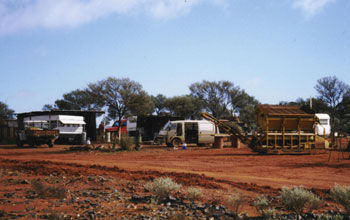 |
This is the campsite we called base. An absolute luxury! |
The bit of ground Mark had selected for us was on a registered tenement, that was being worked by a bloke who I will call Fred. Fred has about 1000 acres in 4 adjoining claims. He has worked a large portion of the area using metal detectors, jack hammers and a dry blower. Dry blowers are unique to arid areas of Australia where there is no water to run a 'wet plant'.
Dry blowers are large machines that have alluvial dirt dropped into them by front end loaders and the dry blower shakes the soil around, and using air and gravity separates the heavies (gold) from dirt and rock. They can be quite effective and fine gold down to 0.01 of a gram can be recovered. Anyway, Fred had been using his dry blower for some time and had scratched out a living. He had stablished a good base camp with several old caravans (Americans call them Trailers), and had sheds, a bush shower (with water heated by lighting a fire under a 44 gallon drum), and a toilet (known as a Thunder Box) built over an old mine shaft. The camp was luxurious by our bush standards.
The deal that Mark had struck with Fred was that Mark, Garry, Rob and I would camp at Fred's base camp and use it as our base. We would then go out and detect for gold on Fred's lease, and declare every bit of gold we found, and from this Fred would take a royalty of 50%. This appeared to be a good deal because we knew the area was nugget producing, and that Fred was a hard nosed leaseholder who had never let people onto his claim to detect for gold. Fred didn't want people on his lease because he figured he had a legal right to dig it all up, and he had gone to considerable expense and trouble to get the tools and equipment to dig it up. A few weeks prior to us going up there Fred had gone down to Perth for a few days, and from what he heard later, as he drove off some of the local lads moved in and thumped (claim jumped) his claim until he came back, some of them were supposed to have made a years wages in a few days from a good 'patch' of gold they detected.
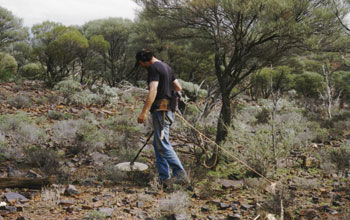 |
"Chaining off" on what was to become a really rich patch |
Anyway, when we arrived late in the night at Fred's camp, Garry and Rob had already arrived (they had driven all day from the Eastern goldfields of WA). We were all pretty well tired so we pulled out the swags and rolled them out and hit the sack. I was happy because I got to sleep in the caravan, but Mark being a 'bushy' at heart chose to sleep under the stars.
Too bad for Mark that he hadn't taken notice of the forecast, because the stars became hidden by the clouds, and then the rain came down. He stuck it out and next morning I had my first look at the country. The landscape was low rolling hills coming down across gentle slopes, and long flat plains. To the East was a huge salt lake (more than 10km long). The ground was red dirt and had rocks sticking out from it everywhere. It almost looked like the beach when the tide goes out. The vegetation was sparse with a hit of green resulting from the winter (May June) rains. Ancient Mulga trees 2-3 meters tall grew dispersed across the landscape. I was told how lucky I was to be there in June as it gets to over 45 degrees Celsius for months on end during the summer.
The 4 of us decided to work closely together and split the remaining 50% four ways. This meant that we were working together and that we were not tripping over each other. A deal like this requires the giving and taking of considerable trust, and only works on a handshake. When you are stuck in the bush working for gold, you need to trust your mates, and not have to doubt them. The reason we were working together was for the gold, and we each knew that if we worked professionally together we could collectively cover huge amounts of ground each day, and that the ground we covered would be well detected with little chance of leaving anything behind.
We decided to accept Fred's offer to show us around. Fred piled us in the back of his brand new Toyota 4WD and took us on a tour of his lease. He told us about all the gold he had found, where he had found it, at what depth, and what the ground was like (stone, gravel etc) associated with the gold. All these things were important to us, and we would have learned them anyway, but Fred was saving us precious time.
After the tour we went back to the camp for a brew, and then headed out. We had agreed to start on a small 'flat' half way up a gentle rise. Within 5 mins of us turning on our detectors, each of us had at least one nugget. None were much larger than finger nail clippings, but it was good to be amongst it early. I copped heaps from the 3 Western Australian prospectors. If there is one thing a WA prospector doesn't like it is a prospector from the Eastern States of Australia, and the worst (it seems) are prospectors from Victoria. They gave me heaps, up until about the 30 minute stage when I found a half kilo lump of stone that had 4 ounces of gold visible on it! The specimen was coated with red dirt and the gold poking through made it look great! Well, great excitement was had, everyone having a look, and a hold before we settled down and kept working. We were all optimistic that more pieces would be found.
Though out the day we came back to the vehicles for a break. The first one back got the fire going and put the billy on to heat the water, and soon after the rest drifted in. A hot bush brew of tea or coffee is relaxing. Those who wanted food ate, the others didn't. We were on gold from the start and we kept exchanging notes of where the gold was found; why it was there, what caused it to be there, where had it come from and where was it going to were the questions that could help us find more gold.
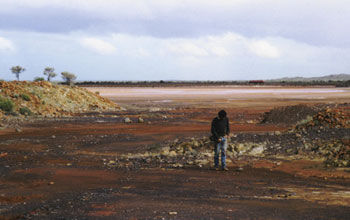 |
Here is one of our team "chaining off" a section of the goldfields, with Lake Austin, near Cue in Western Australia, in the background |
Day two Garry and Rob chained of an area of cap rock that Fred said he had not worked properly. Mark and I decided to work about 1000 meters below the 'run' as this was where larger pieces might have been. The lads had told me that gold in this area tends to be formed where quartz and ironstone 'make' or meet. The 4ozt specimen I had found the day before was a perfect example of this as it showed the quartz, the iron stone and the gold in the middle. The country was dispersed with dark rock formations. I had been told that this was a BIF (banded iron formation) and these were associated with the gold. Mark said that in this area, the first shed of gold from the reefs produced the biggest lumps, and he had found really big bits of gold miles away from where they had shed, but he warned me that although the gold could be big, the nuggets were few and far between. We didn't find any, but the sound of the Kango rock jackhammer and electric generator (gen set) caught our attention so we headed back to where Garry and Rob were merrily digging bits of gold out of the cap rock. Cap rock is a cement type of formation where ancient riverbeds literally go rock hard and they contain sand, gravel rocks and occasionally nuggets. The problem is the extreme hardness of the 'cap', thus the Kango.
We all had a go on the Kango. It is exciting as you know you have a metal target where no rubbish can be so it has to be gold, but the only problem is how big the nugget might be, and how deep it might be. I know men who have had to dig 4ft into the cap to get a nugget out, expecting the nugget to be over 100 ounces, but finding it to be only 4 ounces. Our deepest hole in the cap was only about 400mm, and that took about 25 mins to dig down to. By the way I know one prospector who didn't have a Kango, and he got a good signal in the cap and started digging with a hammer and a cold chisel. It took him the best part of 2 days to drop onto the nugget. His hands were bleeding and bruised, and he was thoroughly sick of it by the time he recovered his 5 ounce nugget at just over 3 feet.
The next day we decided to work wide of where Fred had been. This new ground held some promise as it was miles from camp and not where the old timers had been, or so we thought.
Garry and Rob worked down the hill, Mark went wandering, and so did I. Sometimes when the gold starts to dry up a good way to find some is to have a $2.00 bet with your mate on who will find the first bit of gold. Mark and I headed off east and west roughly heading toward the head of a gully to the north of us. I read the ground and worked a likely area and found a small piece, so headed off in search of Mark to let him know about it. As I got to the top of a ridge I saw that Mark had reached the head of the gully before me, and he was walking down the hill toward Garry and Rob, but what seemed strange was that he didn't have his detector. We all met at the one time. Mark had detected a really nice 50 gram nugget high up and had brought it down to show the others. Rob had found some nice small ones. I showed Mark the little one I had found and he asked "when" to which I replied "about 5 mins before, his reply was "Bad luck I found this about 6 minutes ago" (by the way, these $2.00 debts are never called, as they are more for encouragement and a bit of fun).
We all went back up the hill with Mark and figured out where the gold came from and why it was there. We figured out a work plan and hooked in. I found 2 nice bits before dark, and Mark found another bit weighing around 6 grams. Garry, decided to detect just at the head of a little water course in the gully. The sound of his pick beating the ground caught my attention, so I went up and offered to dig for him. Just then the signal came out of the hole. We both knew it might be a good nugget, and sure enough it was. It weighed in at a little over an ounce.
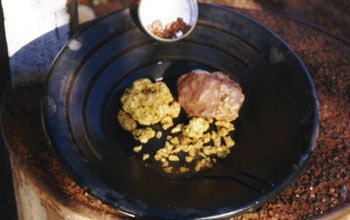 |
This is all the gold we found on this trip. You can see the 20 ounce nugget and the specimen with 4 ounces of gold along with the rest of the haul |
The midgies (sandflies) and mossies (mosquitos) were becoming a pain, and the sun was going out so we headed of to camp.
The next day we were all up early and headed out. Mark and Garry chained off the patch. A patch is an area of ground enriched with nuggets, and chaining is where the detector operator drags a length of chain by a rope behind them. This practise is super efficient, as the dragged chain scrapes a line along the red dirt and stone, thus permitting the operator to see where the detector has worked.
You head off in a straight line and then turn around when you think you are clear of the gold bearing ground. The grid lines that are formed are usually not more than about 18 inches apart.
The closer the better as it is really easy for a person to miss a nugget and the more times you swing the coil over the ground the better chance you have of hearing all that is there. Mark worked high, and Garry started gridding (chainage) about half way. Rob and I worked wide. I came back about mid day having only found one small piece about 2kms away. I bumped into Mark and Garry, and as usual I asked how they did. Mark said they had found a bit and that they had stowed it behind the right hand wheel of the trailer attached to Garry's 4WD. I headed up the hill to see what they had found and about 30ft out I caught sight of gold. Garry had detected a nugget deep in the red dirt, and had become most upset as he knew the signal was gold, but couldn't get anyone's attention to come and see the nugget come up. The nugget weighed 20 ounces, and could easily have been used to chock the wheel of the trailer. Beside the 20 ounce nugget were a few ounces of other nuggets that also been found.
Over the next few days we worked hard, dug heaps of holes, found all kinds of old mining rubbish left over from the gold rush in the late 1800's. Every day it rained, and every day we got eaten alive by the midgies and mossies.
For me the beers around the campfire at night were interesting. We all swapped prospecting stories, like "Your first nugget... your biggest nugget....your best day.... your best patch..." Although Garry has been a highly successful prospector for more than 10 years, that 20 ounce nugget was the biggest he had found, so we were all really happy to be present at a landmark in his career. Over the years Mark had found more than his body weight in gold (not bad for a bloke who has just turned 40) with the biggest piece at about 116 ounces. I had found a single nugget weighing 43 ounces in '89, and I can't remember what Rob had found. We all had stories to tell of gold, and I couldn't help but feel that we live in historic times. In the not too distant future the 'easy' gold will be gone, and our children will listen with disbelief to our stories. The other thing to remember is that you only tend to hear about the good times, but prospectors can go for months 'on the smell of an oily rag' and be out of luck, no money, no food, no fuel, and then have one good day that can bring in wages for a year. Many prospectors here never find enough gold to pay for their detectors, but they love the hobby of prospecting.
Fred had been good, in that he had bull dozed the patch we had found to get us down a little deeper. This worked as we kept on finding more nuggets, but the rain kept on coming down and stopped us from digging more ground. We reckon that the gold is still there, and that the biggest pieces are still down deeper as we had not seen 'bottom'. Over the next few days we worked the patch out, and searched for new ground.
Mark and I went for a drive to see some of his old patches, one of which had gone about 140 ounces. I think in the space of about 4 miles he told me of about 1000 ounces he had found over the years.
We got around into a hidden gully that the old timers had worked. Mark stopped the 4WD and showed me where he and some mates had camped years ago. He said he was looking for the old camp fire and when I asked why he told me that when they were going to make a fire to boil the billy he had jokingly said that he had better wave the coil over the site just in case they were building the fire on gold. He did wave the coil over the proposed fire site and found a half ounce piece right where the fire was going to be!
We didn't find his old fire site but as we walked back to the 4WD I spec'd (saw with my eyes) two small nuggets lying on the surface of the ground. Mark worked this area for the rest of the day and found about a dozen small pieces I detected another nugget then spec'd a 3 gram piece lying out in the open shining in the sun (who needs detectors to find gold!)
When the trip came to an end we waxed up (divided up) the gold. For a week we had found more than a Kilo of nuggets. My share worked out to be just over the weight of the specimen I had found in the first 30 mins so with the consent of my partners I took it, and a few others home. I can remember thinking on the flight over that I needed about 4 ounces to make the trip pay for its self, and here I was going home with more than 4 ounces. Years ago I used to like fishing, and I know some folks like golf, but while these things are enjoyable they really do not compare with prospecting for gold, and it is hard to have a fishing trip or a day at the golf that pays for its self!
I love gold and I love the search for gold. I love getting out into the bush with good mates. I love the history, tradition, high technology, skill, hard work and considerable luck that goes into finding gold.
If anyone has any questions about Australian gold prospecting, or Australian gold, please feel free to contact me. I own Australian Native Gold Pty Ltd, a business that deals in Australian gold nuggets, and if you come to Ballarat, Victoria, Australia please drop into our new shop (The Mining Exchange Gold Shop), we would love to see you. If I haven't been encouraged to part with it, you might also see the 4 ounce specimen I found on this trip.


